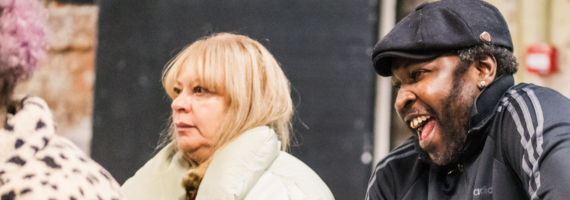

At Cardboard Citizens, we are using Black History Month to reflect on the importance of ensuring Black people are not only seen, but heard – a commitment echoed in More Than One Story: The Anthology. We believe it is vital to challenge the narratives too often imposed on the Black community, and instead create space for voices and stories that inspire lasting change.
As part of this, we spoke with facilitator and artist Chantelle Dusette, who recently led a workshop with our Members, ‘‘Reclaiming Narratives”. Together, they explored the importance of telling their own stories, and the transformative impact rooted within having these stories heard.
What were participants invited to explore in this workshop?
[Last year] we looked at the stories that are out there currently and… we thought about what was missing and what stories would we like to tell and so part two[this year] is the stories that we want to tell and so what we’re going to be doing is examining those and setting up very mini kind of writer’s room style workshopping on different story ideas so that…we create as many stories as we can to have an arc whether it’s for, you know, a pilot or a film or a play or whatever it is, there are some beats, there are some points and so writers can go away and have something they can start working on straight away. It’s just really giving people agency to tell their stories and helping them think in a different way collaboratively in terms of how they get to write the stories they want to tell.
What advice would you give to participants who want to step into their power, creatively and personally?
So, you can’t step into your power if you don’t know who you are. That’s the first thing. You have to strip away every limiting belief – anything you’ve agreed with about yourself that isn’t true – and that takes time; it’s a process. Once you know who you are, you also have to love who you are. That’s important.
You can’t be empowered if you don’t love yourself; it doesn’t make sense. So, know yourself, love yourself – that’s the foundation.
When it comes to being creative, it’s about responding to what moves you. You might watch something, read something, or have an idea that stirs something in you – and you feel compelled to create.
Stories don’t get created alone. No one person writes the whole story – it just doesn’t happen. So, get used to collaborating: sharing ideas, talking, trusting, finding people you enjoy working with, who understand you and who you understand in return. Build relationships where you can play, be vulnerable, and create freely.
And don’t overthink it. Thinking is good, but just start. One foot in front of the other – start doing it, and you’ll find yourself growing more confident, discovering your voice, and becoming empowered.
How can storytelling help shift these narratives from blame to justice?
So I think we are in the UK living in febrile times – generally, but especially here – because of wealth inequality across the board. Somebody always has to be the scapegoat, right?
It’s the immigrant, single mothers, whoever becomes the target — but often it’s the immigrant. And that basically means anyone who isn’t white; in real terms, that’s how it plays out. It can be anyone with an accent, anyone who’s different – and they get to be othered. That’s important to say, because that’s the backdrop against which we’re looking at Black people who are disproportionately affected by homelessness and wealth inequality.
Those things together make it very difficult, so it’s vital that Black people with those experiences tell their stories. There’s a real misunderstanding of what homelessness means, and that’s something that has to be shifted. It’s complex, when you have those things weaved together, which you have to unweave.
I think it’s crucial that people who can speak to that experience share their experiences, shift mindsets, move the dial, and create compassion and understanding. Because it could happen to anyone, especially if you’re in a macro structure that is not designed for you. It’s about creating awareness, understanding, empathy, and compassion so we can start to ask why these things happen – and, if we want change, fight for it.
As part of our recent workshop on Reclaiming Narratives, participants shared some of the Black creative works that have inspired, resonated with, and reflected their experiences. These included:
TV & Film
- Dreaming Whilst Black, BBC Iplayer (2023)
- American Fiction, Prime Video (2023)
- Lovecraft Country, Prime Video (2020)
- Love Life, Netflix (2020–2021)
Theatre
- Not Your Superwoman, Bush Theatre (2025)
- Retrograde, Apollo Theatre (2025)


